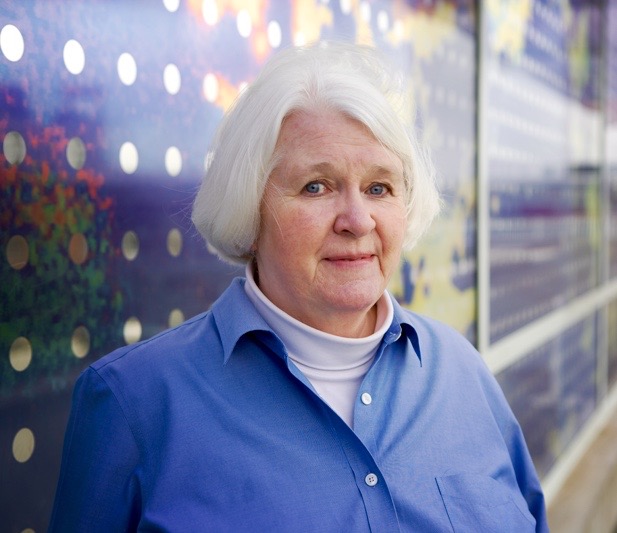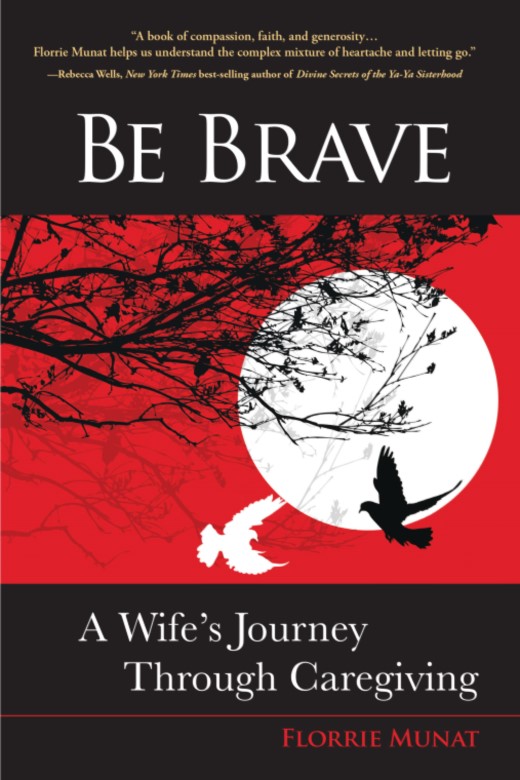Guest article by Florrie Munat
A 2015 report by AARP and the National Alliance for Caregiving found that 43.5 million Americans provided unpaid care for a relative or friend during the prior 12-month period. That’s more than 13% of the population — a lot of caregivers. And our numbers are growing.
 But as impressive as those statistics are, I find them ironic. Because when I became a caregiver, I felt totally alone. I wondered if anyone had ever felt the same way I did. I was overwhelmed by emotions—anger, guilt, despair, sorrow, confusion, anxiety—you name it, I felt it. I fell into a depression I’d never known before.
But as impressive as those statistics are, I find them ironic. Because when I became a caregiver, I felt totally alone. I wondered if anyone had ever felt the same way I did. I was overwhelmed by emotions—anger, guilt, despair, sorrow, confusion, anxiety—you name it, I felt it. I fell into a depression I’d never known before.
In Be Brave: A Wife’s Journey Through Caregiving, I describe how I moved from fearing and rejecting my new life to accepting it. How did this happen?
Stroke
My caregiving story began on a sunny day in June 2003 after my husband Chuck suffered an ischemic stroke.
One day he was an active, intelligent, 69-year-old retired teacher and writer, able to drive his car, dress himself, take a shower, and create intricate family genealogies. That was the “Old Chuck,” the one I’d lived with for thirty-four years.
Overnight, he became dependent on others for his basic needs: bathing, toileting, dressing, transferring. Worse, he was confused, unfocused, and generally not himself. Not the “self” I knew anyway.
Each morning, I’d enter his hospital room with high hopes that Old Chuck would be back. Instead, there was New Chuck, the wild-eyed one who couldn’t remember our children’s names when I showed him their photographs. The one who wandered the hospital barefoot, trying to find his way home.
Lewy Body Dementia
After his hospital stay and three weeks of rehab at a skilled nursing facility, Chuck did come home. But the demands of caring for him there were too great. I had him readmitted to the facility, a decision that piled guilt on my already shredded self-confidence. Two months later, Chuck was diagnosed with Lewy body dementia. For the next six years, he lived at the nursing facility, and I became his daily visitor.
Though I was filled with fear and anxiety about our future, over time I realized I was adapting to this new chapter of our marriage. My dreadful emotions began to segue into acceptance and peace. Or to use a more powerful word, caregiving was transforming me.
Transformed Caregiver
Franciscan theologian Richard Rohr says, “Transformation more often happens not when something new begins, but when something old falls apart.”
That’s a perfect description of what happens when you become a caregiver. Life falls apart—and that’s the moment your transformation begins.
Our old way of being together in a marital partnership fell apart the day of Chuck’s stroke. We had to release that old way and find a new way.
Finding A New Way
 But finding a new way takes time. Transformation isn’t a one-day phenomenon. It’s a gradual, subtle process—like a bulb lying underground until it’s ready to break through the dirt into the sunlight. Being buried in darkness is a prerequisite for a bulb’s transformation into a flower. Working through my emotions was a prerequisite for me to transform into a caregiver. But like a bulb, I had to stay in the dark, changing subtly, before I could rise into the sunshine.
But finding a new way takes time. Transformation isn’t a one-day phenomenon. It’s a gradual, subtle process—like a bulb lying underground until it’s ready to break through the dirt into the sunlight. Being buried in darkness is a prerequisite for a bulb’s transformation into a flower. Working through my emotions was a prerequisite for me to transform into a caregiver. But like a bulb, I had to stay in the dark, changing subtly, before I could rise into the sunshine.
What do you do when you’re in between releasing your old way and finding your new way? My not-so-easy answer is that you have to hang in there, experience your emotions (don’t try to dodge them), and wait.
While you’re waiting, I suggest you focus on your caregiving, really embrace it. And I know that can be difficult and painful. I can’t tell you that your road will be easy. But you already know that.
At the same time, I suggest you begin to stockpile moments when you experience hope. When you receive an unexpected blessing. When your loved one says something that makes you laugh. When you find an activity that brings you joy.
This accumulation of hopeful moments will assist your transformation, and you’ll find yourself moving toward acceptance. And one day you’ll say with surprise, “I’ve changed.” That’s transformation.
Wherever you are in your journey through caregiving, remember that you are changing. Try to pay attention to the transformation that’s occurring in your life. Your journey through caregiving is a process. Take note of your progress, and be proud of yourself!
May you find many blessings!
Florrie Munat spent six years caregiving for her husband Chuck, who had Lewy body dementia. She published a memoir about her experience, Be Brave: A Wife’s Journey Through Caregiving. A former librarian and English teacher, she lives on Bainbridge Island, Washington, where she is writing a memoir about grieving.









The book “Be Brave” was a source of great comfort and support for me as I journeyed through the years of my husband’s life with dementia and his ultimate death. So many times when I felt close to despair I would remember Florrie’s words and find the strength to get out of bed and face another day. Her love for Chuck and her compassionate heart helped me to “be brave”!
Thank you for taking time to share this inspirational testimonial, Judy.
I found Florrie’s words – especially, her analogy about the bulb to be quite illuminating.